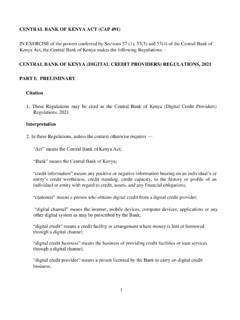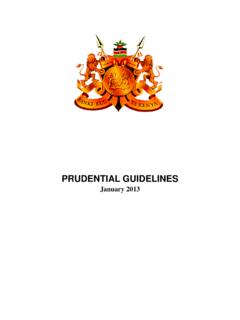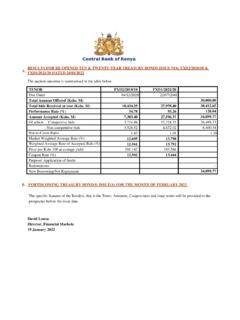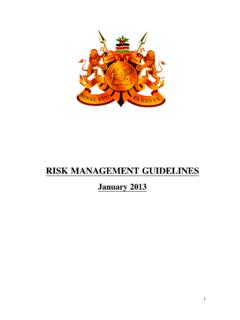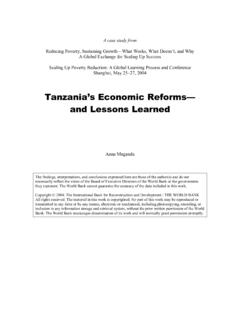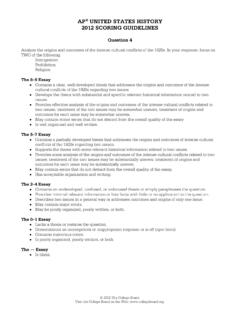Transcription of LAWS OF KENYA The Banking Act CHAPTER 488
1 LAWS OF KENYA The Banking Act CHAPTER 488 Note This edition incorporates amendments up to 15th September 2015 PRINTED AND PUBLISHED BY CENTRAL BANK OF KENYA FOR INTERNAL USE ONLY 1 CAP 488 Banking ACT ARRANGEMENT OF SECTIONS Section PART I - PRELIMINARY 1 - Short title 2 - Interpretation PART II-LICENSING OF INSTITUTIONS 3 - Restriction on Carrying of Banking Business, Etc 4 - Application for License. 5 - Licensing of Institutions. 6 - Revocation of License. 7 - Minimum Capital Requirements. 8 - Location of Places of Business. 8A - Branches and Subsidiaries 9 - Amalgamations and Transfer of Assets and Liabilities. 9A - Directors, Chief Executive Officers and Significant Shareholders to be Fit and Proper PART III-PROHIBITED BUSINESS 10 - Limit on Advances, Credits and Guarantees.
2 11 - Restrictions on Advances, Credits and Guarantees. 12 - Restrictions on Trading and Investments. 13 - Restrictions on Ownership of Share Capital of an Institution. 14 - Restrictions on Advances for Purchase of Land. 15 - Mortgage Finance Companies. 16 - Restrictions on Deposit Taking. 16A- Imposition of Charges and Payment of Interest PART IV-RESERVES AND DIVIDENDS 17 - Ratio Between Capital and Deposits. 18 - Ratio Between Capital and Assets 19 - Minimum Liquid Assets. 20 - Restrictions on Dividends. 20A Financial Year 2 CAP 488 Banking ACT PART V-ACCOUNTS AND AUDIT 21 - Form of Accounts. 22 - Accounts to be Exhibited. 23 - Submission of Accounts to the Central Bank. 24 - Appointment of Auditors. 25 - Change of Auditors to be Notified to the Central Bank. 26 - Auditor s Duty of Confidence. PART VI-INFORMATION AND REPORTING REQUIREMENTS 27 - Collection of Information by Central Bank.
3 28 - Furnishing of Information. 29 - Minister may Require Further Information. 30 - Time to Furnish Information. 31 - Publication of Information. PART VII-INSPECTION AND CONTROL OF INSTITUTIONS. 32 - Inspection of Institutions. 32A- Vetting of Officials 33 - Powers of Central Bank to Advise and Direct. 33A- Power upon Audit and Inspection. 34 - Powers of Central Bank to Intervene in Management. 34A - Voluntary Liquidation. 35 - Liquidation of Institutions by Central Bank. 35A - Expenses under Part PART VIII-THE DEPOSIT PROTECTION FUND 36 - Deposit Protection Fund Board. 36A - Objects and Functions of the Board 36B - Remuneration of Board Members 36C - Protection from Personal Liability 37 - Deposit Protection Fund 38 - Contribution to the Fund. 39 - Protection of Deposits. 40 - Rights of the Board on Insolvency.
4 40A -Rights of Assignments. 3 CAP 488 Banking ACT 41 - [Repealed]. 41A - Administration of Assets. 42 - Annual Reports, etc PART IX-REPRESENTATIVE OFFICES OF FOREIGN INSTITUTIONS 43 - Representative Offices of Foreign Institutions. PART X-MISCELLANEOUS PROVISIONS 44 - Restriction on Increase in Bank Charges. 44A- Limit on Interest Recovered on Defaulted Loans 45 - Minister to Consult with the Central Bank. 46 - Bank Holidays. 47 - Orders by High Court. 48 - Disqualification of Officers. 49 - Penalties for Offences. 50 - Penalties for Default by Officers. 51 - Misleading Advertisement for Deposits. 52 - Civil Obligations. 52A Act to Prevail in Event of Conflict. 53 - Exemptions. 54 - Act not to apply to certain institutions. 55 - Regulations. 56 - Repeal and savings. SCHEDULES FIRST SCHEDULE: Criteria for Determining Professional and Moral Suitability of Directors and Senior Officers Proposed to Manage or Control Institutions SECOND SCHEDULE Minimum Capital Requirements SUBSIDIARY LEGISLATION The Banking (licences) (forms and Fees) Regulations The Banking (deposit Protection Fund) Regulations,2003 The Banking (penalties) Regulations, 1999 The Banking (liquidation of Institutions) Regulations, 1992 The Banking (exchange of Information) Regulations, 2004, Repealed by Ln/97 of 2008 4 CAP 488 Banking ACT Revocation.
5 The Banking (fees) Regulations, 1994 The Banking (increase of Rate of Banking and Other Charges) Regulations, 2006 Exemption-cfc Stanbic Holdings Limited-1st June, 2008 The Banking (Credit Reference Bureau) Regulations, 2008, Repealed by Ln/5 of 2014 Revocation. Exemption-gulf African Bank Limited 2009 Exemption-co-op Holdings Co-operative - 8th August, 2008 Exemption-helios Eb Investors, 2008 Exemption- Middle East Bank Limited, 2011 Exemption - Victoria Commercial Bank, 2011 The Banking (Credit Reference Bureau) Regulations, 2014. THE Banking ACT No. 17 of 1985 No. 20 of 1989 No. 13 of 1994 No. 3 of 1997 No. 10 of 1997 No. 55 of 1998 No. 5 of 1998 No. 9 of 2000 No. 24 of 2002 No. 15 of 2003 No. 9 of 2006 No 19 of 2006 No. 9 of 2007 No. 8 of 2008 No. 8 of 2009 of 2010 5 CAP 488 Banking ACT Commencement: 27th October, 1995 An Act of Parliament to amend and consolidate the law regulating the business of Banking in KENYA and for connected purposes.
6 PART I PRELIMINARY Short title 1. This Act may be cited as the Banking Act Interpretation 2. (1) In this Act, unless the context otherwise requires No. 8 of 2009 of 2013 agency means an entity contracted by an institution and approved by the Central Bank or sub-contracted by such entity to provide the services of the institution on behalf of the institution, in such manner as may be prescribed by the Central Bank; No. 14 of 2008 Provided that where such entity is a co-operative society, prior approval to provide the services shall be sought from the sacco societies Regulatory Authority established under the sacco societies Act, 2008 assigned capital has the meaning given to it in section 7(4); No. 8 of 2009 bank means a company which carries on, or proposes to carry on, Banking business in KENYA but does not include the Central Bank; Banking business means (a) the accepting from members of the public of money on deposit repayable on demand or at the expiry of a fixed period or after notice; (b) the accepting from members of the public of money on current account and payment on and acceptance of cheques; and 6 CAP 488 Banking ACT No.
7 57 of 2012 No. 57 of 2012 (c) the employing of money held on deposit or on current account, or any part of the money, by lending, investment or in any other manner for the account and at the risk of the person so employing the money; (d) such other business activity as the Central Bank may prescribe. Banking group means a licensed institution and its subsidiaries, non operating holding companies and subsidiaries of its non operating holding companies; Board means the Deposit Protection Fund Board established by section 36; No. 10 of 2006 of 2009 branch means any permanent premises, other than its head office, at which an institution transacts business in or outside KENYA ; capital means paid-up share capital or, in the case of an institution incorporated outside KENYA , its assigned capital; Cap 491 No.
8 57 of 2012 the Central Bank means the Central Bank of KENYA established by the Central Bank of KENYA Act; competent authority means any of the bodies set out in the Third Schedule; No. 57 of 2012 convertible currency means currency which is freely negotiable and transferable in international exchange markets at exchange rate margins consistent with the Articles of Agreement of the International Monetary Fund; co-ordinator means the Central Bank; No. 4 of 1999 "core capital" means permanent shareholders' equity in the form of issued and fully paid-up shares of common stock, or in the case of foreign incorporated banks, of the assigned capital, plus all disclosed reserves, less goodwill or any other intangible assets; 7 CAP 488 Banking ACT No. 4 of 1999 current account means an account maintained by a bank for and in the name of, or in a name designated by, a customer of the bank into which money is paid by or for the benefit of such customer and on which cheques and other bills of exchange may be drawn by, and transfers and other Banking transactions made on the instructions of the customer; "disclosed reserves" includes all reserves created or increased through share premiums, retained profits (after deducting all expenses, provisions, taxation and dividends) and general reserves if such disclosed reserves are permanent and unencumbered and thus able to absorb losses; No.
9 10 of 1997 financial business means: (a) the accepting from members of the public of money on deposit repayable on demand or at the expiry of a fixed period or after notice; and (b) the employing of money held on deposit or any part of the money, by lending, investment or in any other manner for the account and at the risk of the person so employing the money; No. 57 of 2012 financial institution means a company, other than a bank, which carries on, or proposes to carry on, financial business and includes any other company which the Minister may, by notice in the Gazette, declare to be a financial institution for the purposes of this Act; "financial year" means the financial year prescribed in section 20A; group means a non-operating holding company, its subsidiaries and all associated companies of the parent or its subsidiaries.
10 Institution means a bank or financial institution or a mortgage finance company; land includes freehold and leasehold land in KENYA and all buildings and permanent improvements thereon; 8 CAP 488 Banking ACT licence means a licence granted under section 5; members of the public means individuals, partnerships, corporate bodies and trustees or managers of trusts, pension and provident funds or other similar funds; of 2010 mortgage finance company means a company (other than a financial institution) which accepts, from members of the public, money- (a) on deposit repayable on demand or at the expiry of a fixed period or after notice; or (b) on current account and payment on and acceptance of cheques, and is established for the purpose of employing such money in accordance with section 15; No.

